Fruits Dogs Can and Cannot Eat
Most canines are culinary connoisseurs who beg for a taste of any food in their presence. Sometimes they can safely share a snack with their people, but other times they cannot. Some fruits are not only safe for dogs to eat, but also healthy for them. Be sure to check out our post on what vegetables can dogs eat too!
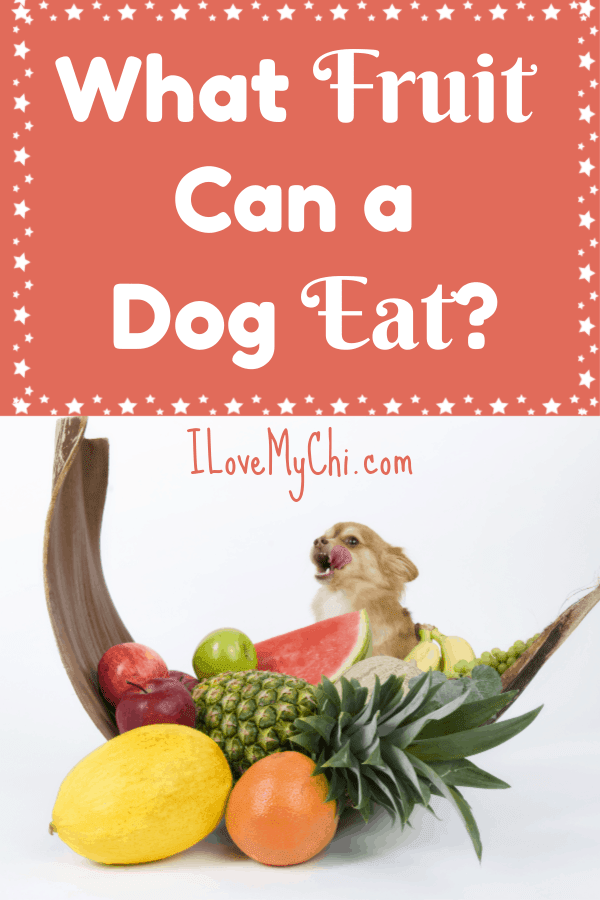
There is nothing I love better than a nice juicy orange or a slice of watermelon. You can also share some fruit with your dog if you’d like. That is, you can share most fruit. Some fruits are toxic to dogs.
Does your dog even like fruit? My Terri-poo used to go crazy for oranges. I believe if you put a steak in front of him and also an orange, he would have picked the orange. He loved them that much.
My beloved chihuahua Kilo loved fruit when she was alive, particularly apples and watermelon. My chihuahua Lucy loves apples and my Yorkie Ziggy loves bananas. My chi-mix Lucas doesn’t seem to care for fruit though. He’s somewhat of a picky eater.
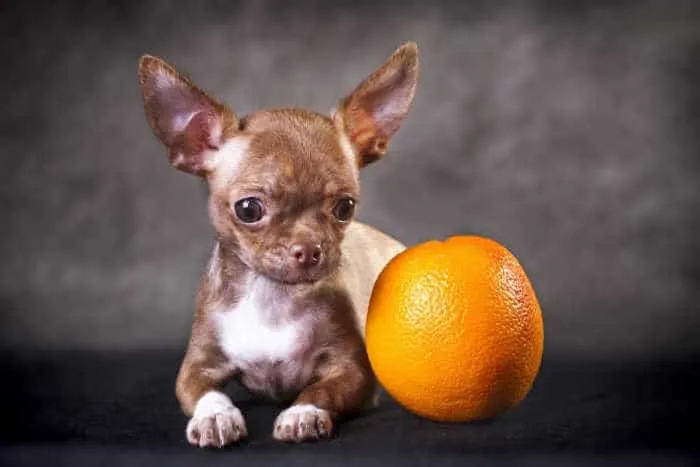
The trick with giving fruit to your dogs is to just give them a little bit. A bite or two will do. Fruit has a lot of sugar and even though it’s a natural sugar, it can still add some pounds to your dog, if your dog has a weight problem.
Let’s discuss what fruits dogs can and cannot have, and what you need to know about feeding fruit to your dog:
What Fruits Can Dogs Eat?
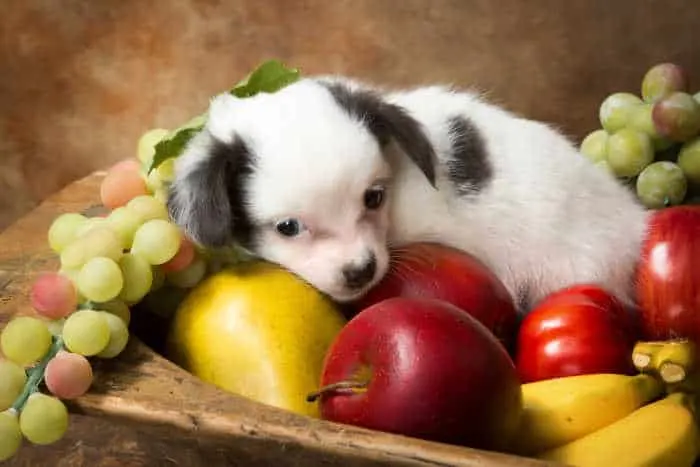
According to the American Kennel Club (AKC), dogs can eat the following fruits:
Apples
Apples are safe for dogs and provide fiber as well as vitamins A and C. A dog should never be given a whole apple to chew on; the apple must first be cored and sliced into bite-size pieces to prevent choking. All seeds and the stem should also be removed before serving.
Bananas
Bananas are safe for dogs and add vitamins, potassium, copper, fiber, and biotin to your dog’s diet. However, since they are high in sugar they should only be a snack, not a dietary staple. A good way to measure out the size of a banana snack is to give your dog a piece appropriately sized for their stature when you eat a banana, rather than preparing a banana specifically for your dog to eat.
Blackberries
Blackberries are a great treat for dogs. They don’t have much sugar and are easy to eat.
Blueberries
Blueberries are dog safe. They offer healthy antioxidants and are a good source of fiber. For a refreshing summer snack, freeze blueberries in ice cubes for your dog to enjoy.
Cantaloupe
Cantaloupe is safe for dogs, feeding it provides fiber and water to their diet. Since they are high in sugar they must be fed in moderation as a snack, not a regular part of a doggy diet. Use the same tip for feeding bananas; when you eat cantaloupe set aside some plain pieces for your dog to eat.
Cranberries
Cranberries are safe for dogs to eat; they may eat fresh or dried cranberries in moderation. However, exercise caution if feeding dried cranberries because many times dried fruits contain sugar or other additives that are not dog safe.
Mangoes
Mangoes are safe for dogs to eat, but the pit must be removed and they must be cut into bite-sized pieces before serving. Mangoes are a good source of potassium, alpha-carotene, and beta-carotene, as well as vitamins E, C, B6, and A for dogs.
Nectarines
Nectarines are okay in moderation as they have a lot of sugar.
Oranges
Oranges are safe for fido to feast upon, however, most dogs are not a fan of citrus flavor and prefer not to eat them. Should your dog enjoy citrus, they will receive vitamin C, fiber, and potassium from this sweet snack. Oranges should only be fed without their seeds or peels. Give one or two segments of an orange as a snack as too much is high in sugar and not good for your pup.
Peaches
Peaches are safe for dogs and provide them with fiber and vitamin A. However, dogs cannot have peach pits because they contain cyanide. Dogs may eat fresh or frozen peaches, cut into bite-sized pieces. Be sure to avoid canned peaches because they are usually in syrup that is not safe for dogs.
Pears
Pears are safe to add to your dog’s snack menu. Pears offer dogs fiber, vitamins K and C, and copper. Pears should be cut into bite-sized pieces and the stem, all seeds, and pits must be removed before serving because they contain cyanide. Dogs should not be fed canned pears because they are usually in a sugary syrup; stick with fresh or plain frozen pears.
Pineapple
Pineapple is safe for fido to feast on. Pineapple offers dogs fiber, minerals, vitamins, and bromelain which aids in protein absorption. Be sure to remove the outer pieces just as a chef would prepare a pineapple for people. Dogs should be served fresh pineapple or plain frozen pineapple, not canned because they are usually soaked in syrup that is not safe for dogs.
Pumpkin
Pumpkin is great for your dog. It helps with digestive issues and is a good source of fiber. If you prefer canned pumpkin, make sure you get the kind that is pure pumpkin and not the kind of pumpkin pie mix used for making pies.
Raspberries
Raspberries are safe for dogs in moderation (less than one cup at a time for large dogs, less for smaller dogs). Feeding raspberries in moderation is key because they naturally contain xylitol, also known as birch sugar, which is a substance that is more toxic to dogs than chocolate. That said, raspberries offer dogs antioxidants, vitamin C, fiber, manganese, and anti-inflammatory benefits.
Strawberries
Strawberries are safe for dogs and offer vitamin C, fiber, and an enzyme that may offer teeth whitening. Strawberries may be fed fresh or frozen but should be fed in moderation because they contain sugar.
Watermelon
Watermelon is safe for dogs to eat when the rind and seeds are removed. Since watermelon contains approximately 92% water, watermelon is a great way to help dogs stay hydrated in hot weather. This refreshing fruit offers dogs potassium, vitamins C, B-6, and A.
What Fruits Can Dogs NOT Eat?
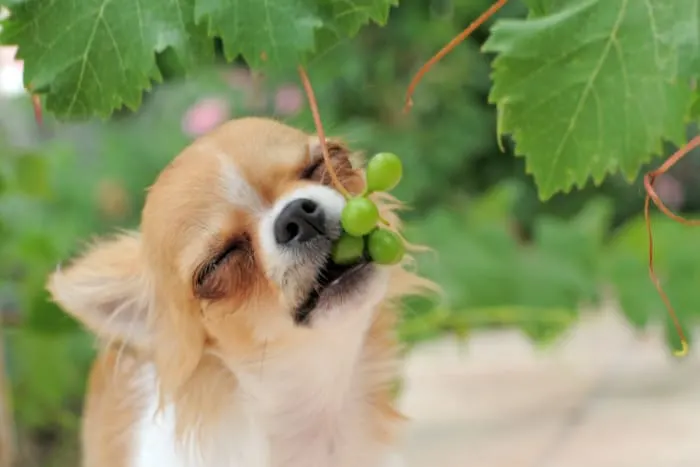
According to the American Kennel Club (AKC), dogs cannot eat the following fruits:
Avocado
Dogs cannot eat avocados because they contain a toxin called persin which causes them to experience digestive upset like vomiting and/or diarrhea. This is confusing to some pet parents because they have heard of a dog food called Avoderm. While raw avocado should not be fed to dogs, Avoderm has found a way to include avocados in their dog food recipes safely, which you may read about here.
Cherries
Dogs should not be fed cherries with pits. Cherry pits contain cyanide which is toxic to dogs. If your dog consumed cherries with the pit still in you can expect the following physical symptoms: red gums, difficulty breathing, and dilated pupils. You will need to seek veterinary care immediately. Also, keep them away from cherry leaves and stems.
Grapes and Raisins
Grapes in all forms, including raisins, must be removed from the menu of all dogs. Grapes are toxic and can cause kidney failure.
Figs
Figs have ficin and fucosin which causes digestive distress in many dogs. It also has way too much fiber for their systems.
Kiwi
You shouldn’t let your dogs eat the seeds or the skin of the kiwi. The kiwi itself has a lot of fiber and may cause your dog to have diarrhea.
Tomatoes
Tomatoes are not safe for dogs to eat. The green parts of tomatoes contain a substance called solanine which is toxic to dogs. Although ripe tomatoes are generally considered safe for dogs, and a dog would have to eat a significant amount of tomatoes to be sick, it is best to avoid the risk by keeping tomatoes off the menu. This is especially important for small dogs since they would not have to eat as much to become sick.
Do not feed dogs pits and seeds from the fruit. Some of them are poisonous and at the very least a choking hazard.
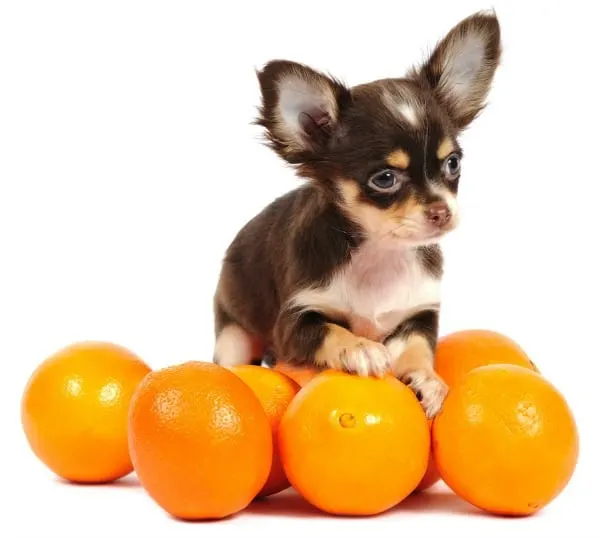
Although you can give the fruit of the orange to your dog, do not let them have any of the peel, leaves, or any other part from an orange tree. Anything other than the fruit itself is dangerous to dogs.
Make sure you wash the fruit (just as you would for yourself) before feeding it to your dog.
Benefits of Feeding Fruit to Dogs
There are many benefits of feeding fruit to dogs, such as:
- Feeding fruits can offer your dog some healthy variety in his or her diet.
- Fruits offer vitamins and other nutrients that are healthy for dogs.
- Fruit is a low-calorie snack, helping your dog maintain a healthy weight while still being able to enjoy snacking.
- Fruits that are safe for you and your dog allow you to snack with your dog, which is a bonding opportunity.
- Some owners choose to grow fruit in their gardens, giving them a healthy form of exercise and the opportunity to know that their dog’s fruit was grown organically. Many dogs enjoy “helping” with gardening by napping in the sun while their owner gardens. Other dogs may enjoy being trained to dig holes for plants in their owner’s gardens.
Purchasing Fruit for your Dog
When purchasing fruit for your dog, keep the following in mind:
- Search for good-quality fresh fruit at a local grocery store or farmer’s market.
- When choosing frozen fruit, look for bags of plain frozen fruit. Avoid frozen smoothie mixes that contain an assortment of ingredients, as they likely are not dog safe.
- If you are purchasing a fruit specifically for your dog, purchase it in moderation since they cannot eat as much in one sitting as we can, and you would not want the fruit to go bad before he or she is able to finish eating it.
- Avoid fruits in cans or in plastic snack cups, as these often are soaked in sugary syrup, which dogs cannot have.
- Dogs do not have to eat organic fruit; it is the preference of their owner.
- Dogs should not be fed fruit that is rotting or on the verge of rotting; it can make them sick. Be as picky about their produce as you are about your own.
Preparing Fruits for your Dog
Here are some tips to follow when preparing fruit for your dog to eat:
- Inspect the fruit before feeding and cut off any mushy or suspicious spots.
- Remove all stems, seeds, pits, leaves, etc, before feeding to your dog.
- Never give a dog a large piece of fruit to chew on like a chew toy.
- Always cut the fruit into bite-sized pieces to reduce the risk of choking.
- In hot weather, consider making your dog a refreshing snack with fruit. Some owners cut up strawberries and bananas, then mix them in water with blueberries and freeze them in ice cube trays or in a plastic bowl. Other owners make a fruit smoothie with water and their dog’s favorite fruits in a blender then pour it into ice cube trays for their dog to eat. The Animal Rescue Site sells a Doggie Cone freezer mold that allows owners to make custom popsicles for their dogs in a shape that can be set on the Doggie Cone holder to hold the popsicle in place while they lick it.
Closing Considerations
Feeding fruit to dogs is a way to offer them a special and yummy, but also healthy, snack. Since most fruit contains sugar, it is best to feed fruit in moderation. If your dog has never eaten a particular fruit before, always feed in moderation to avoid major digestive upset should the fruit not agree with his or her tummy.
What is your dog’s favorite fruit? Please share in the comments below!
These posts might interest you:
- 20 Dangerous Things to Keep Away from your Chihuahua
- Using fruits and veggies in dog’s food
- March is Poison Prevention Month
- How to Make Your Own Dog Food
- Dangers in Autumn for dogs
- Holiday dangers for dogs
- Thanksgiving dangers for dogs
- Should you make your dog’s food?


Tracey
Friday 17th of June 2022
I have a chipoo and for the life of me I can not get her to stop tearing everything up, she is 6 months old, she loves to pick on my shits a weenie and my mini pin she kinda runs things around here, I’ve tried putting her in a play pen and crate nothing seems to work I’ve gotten her so many toys. But on the other hand she can be very loving and cute, she is the stubbornness one I’ve ever had, her is a picture of my little monster, but her name is baby girl, any advice on what to do please help
Dixie
Monday 14th of June 2021
Cathy, I have a problem and I hope you or the members can help me find a solution. My Sweet Rosa is a tiny 3 lb. long hair chibaby. The problem is when she pee pees, the fur around the area kind of rubs in the pee pee and causes her to not only have urine in her fur but also causes knots to form in the fur. My sweet William is also long hair chi but being a little guy, he does not have this problem. Always had short hair chis but did notice this with a peakbaby. I think I need to have the groomer sort of shave the area for Rosa when it is long enough to drag. Thanks to all for any ideas to help me solve my problem.
Cathy
Monday 14th of June 2021
Lucy has this problem so I got a grooming kit off of Amazon and shave that area in between grooming visits. They get professionally groomed about every 3 months. I am a former groomer myself so shaving this area is easy for me but if I hadn't had training, I think I would get a groomer to do it.
Dixie
Saturday 12th of June 2021
The cardinal rule in fruit and chis is NEVER EVER ALLOW YOUR CHI TO COME INTO CONTACT WITH GRAPES OR RAISINS. I learned this the hard way. I had a nice bowl of seedless green grapes and I would bite half and give my sweet Henry the other half. We both ate over a dozen. That night in bed Henry had diareaha 4 or 5 different times. Next came gut wrenching vomiting. I was lucky to have the best vet in town so rushed Henry in and his life was saved after 4 days in deep care. His stomach turned inside out from vomiting, just like a sock. My vet was a miracle worker and Henry lived a long healthy life and I do not bring grapes into my house any more as I have sweet William, my baby Rosa girl and dear rescue Pinto.
Cathy
Sunday 13th of June 2021
I know! One of my family members buys grapes even though I told him how dangerous they are for the dogs. Makes me nervous. I found a partially eaten grape on the floor the other day and panicked. I watched the dogs closely because I don't know which one ate it but fortunately they were all ok.
Lisa
Saturday 11th of May 2019
Hey Cathy, My scooter has to be in the mood to eat fruit. I gave him strawberries yesterday. He sniffed them, walked away then 2 minutes later came back and ate them lol Thanks for the list of what they could and could not eat! Love, Lisa & Scooter ?❤️
Cathy
Sunday 12th of May 2019
LOL, I guess he thought about it a little and decided those strawberries smelled pretty good.
Krystal
Monday 26th of November 2018
My chi mix Bandit loves pretty much any fruit we give him. We rescued him from our Humane Society, they rescued him from a puppy mill. We believe our other chi is a deer head chi and he is very very picky. He will eat carrots (sometimes) and apples (sometimes). He absolutely refuses bananas but he used to eat them all the time. He is also from our Humane Society. They are as close as brothers although Bandit is very skittish. We have had him for around six years and he is not as skittish as he used to be. O.D. (our deer head) used to bark constantly at my aunt. He does not really like other dogs but will tolerate them if he has to. I have been reading these articles recently and they are very helpful! Thank you soo much!
Donna Fransen
Thursday 12th of November 2020
@Cathy,
Cathy
Monday 26th of November 2018
You're welcome Krystal and thanks for telling me about your fur babies!